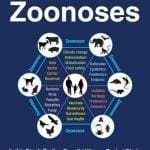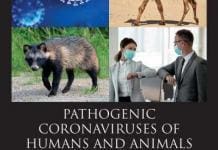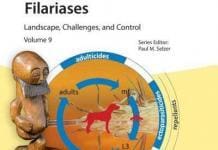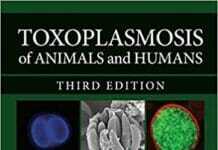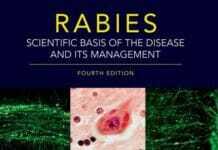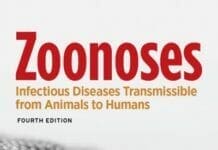Zoonoses, Infectious Diseases Transmissible Between Animals and Humans, 4th Edition
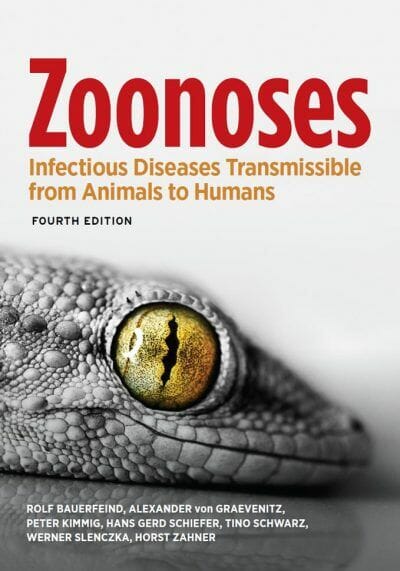
By Rolf Bauerfeind, Alexander Von Graevenitz, Peter Kimmig, Hans Gerd Schiefer, Tino Schwarz, Werner Slenczka and Horst Zahner
Zoonoses, Infectious Diseases Transmissible Between Animals and Humans, 4th Edition PDF. Zoonoses are a persistent threat to the global human health
Today, more than 200 diseases occurring in humans and animals are known to be mutually transmitted. Classical infectious diseases, such as rabies, plague, and yellow fever, have not been eradicated despite major efforts.
New zoonotic diseases are on the increase due global conditions such as overpopulation, wars, and food scarcity, which facilitate human contact with rodents, stray animals, and their parasites. In addition, humans are unwittingly becoming accidental hosts and new links in an infectious chain by engaging in activities such as survival training, which involves camping in open areas and consumption of raw or insufficiently cooked food.
Zoonotic infections cause a variety of symptoms that often do not provide clear evidence of a known disease. Zoonoses, Fourth Edition, describes most occurring worldwide zoonosis and facilitates the identification, diagnosis and treatment of zoonotic infections.
Written by a team of doctors, medical microbiologists and veterinarians, this completely, revised edition covers all aspects of the epidemiology and prevention of zoonotic diseases through clear descriptions of various illnesses. Specifically, this fourth edition covers zoonosis caused by
- viruses, bacteria, fungi and parasites
- infections caused by animal bites
- infections and intoxications by animal foods
- Iatrogenic transmission of zoonotic pathogens
Preface xiii
Introduction xv
Abbreviations xvii
1 Viral Zoonoses 1
1.1 Introduction 1
1.1.1 Classification Principles 1
1.1.2 Zoonotic viruses 1
1.1.2.1 Bat-borne viruses 3
1.1.2.2 Zoonotic viruses as B-weapons 4
1.1.2.3 Global distribution of zoonotic agents 4
1.1.3 Cycles of Arbovirus Infections 5
1.2 Zoonoses Caused by Alphaviruses 8
1.2.1 Agents 8
1.2.2 Alphaviral Zoonoses 8
1.2.3 Eastern Equine Encephalitis 10
1.2.4 Western Equine Encephalitis 12
1.2.5 Venezuelan Equine Encephalitis 14
1.2.6 Semliki Forest Fever 16
1.2.7 Sindbis Fever 17
1.2.8 Epidemic Polyarthritis (Ross River Fever) and Barmah Forest Fever 18
1.2.9 Chikungunya Fever 21
1.2.10 O’Nyong-Nyong Fever 24
1.2.11 Mayaro Fever 25
1.3 Zoonoses Caused by Flaviviruses 26
1.3.1 Agents 26
1.3.2 Complexes of the Flaviviridae with Clinical Importance 27
1.3.2.1 Virus Complex Transmitted by Ticks 27
1.3.2.2 Virus Complex Transmitted by Mosquitoes: Japanese Encephalitis Virus and Related Encephalitis Viruses 27
1.3.2.3 Agents Causing Yellow Fever and Dengue, Forming Two Closely Related Virus Complexes 27
1.3.3 Zoonoses Caused by Tick-Borne Flaviviruses 32
1.3.3.1 Tick-Borne Encephalitis (TBE) European Subtype (Central European Encephalitis) and TBE Eastern Subtype (Russian Spring-Summer Meningoencephalitis) 32
1.3.3.2 Louping Ill 37
1.3.3.3 Powassan Virus Encephalitis 38
1.3.3.4 Kyasanur Forest Disease and Alkhurma Virus Hemorrhagic Fever 39
1.3.3.5 Omsk Hemorrhagic Fever 40
1.3.4 Zoonoses Caused by Mosquito-Borne Flaviviruses 41
1.3.4.1 Japanese Encephalitis 41
1.3.4.2 Murray Valley Encephalitis and Kunjin Virus Disease 44
1.3.4.3 St. Louis Encephalitis 46
1.3.4.4 Rocio Encephalitis 48
1.3.4.5 West Nile Fever 49
1.3.4.6 Usutu Virus 52
1.3.4.7 Wesselsbron Fever 52
1.3.4.8 Yellow Fever 53
1.3.4.9 Dengue Fever (Dengue Hemorrhagic Fever and Dengue Shock Syndrome) 58
1.4 Zoonoses Caused by Bunyaviruses 65
1.4.1 La Crosse (California Encephalitis) Virus, Snowshoe Hare Virus, and Tahyna Virus 68
1.4.2 Oropouche Fever 70
1.4.3 Crimean-Congo Hemorrhagic Fever 71
1.4.4 Rift Valley Fever 73
1.4.5 Sandfly Fever 76
1.4.6 Zoonoses Caused by Hantaviruses 78
1.4.6.1 Hemorrhagic Fever with Renal Syndrome (Old World Hantaviruses) and Hantavirus Pulmonary Syndrome (New World Hantaviruses) 78
1.5 Zoonoses Caused by Reoviruses (Coltiviridae and Orbiviridae) 83
1.5.1 Genus Coltivirus 83
1.5.1.1 Colorado Tick Fever 83
1.5.2 Genus Orbivirus (Kemerovo Complex) 85
1.5.3 Genus Rotavirus 85
1.6 Zoonoses Caused by Arenaviruses 88
1.6.1 Lymphocytic Choriomeningitis 89
1.6.2 Lassa Fever 92
1.6.3 Zoonoses Caused by New World Arenaviruses (Agents of Hemorrhagic Fever) 95
1.7 Zoonoses Caused by Filoviruses 97
1.7.1 Marburg Virus Hemorrhagic Fever 99
1.7.2 Ebola Virus Hemorrhagic Fever 104
1.8 Zoonoses Caused by Rhabdoviruses 109
1.8.1 Rabies 110
1.8.2 Vesicular Stomatitis 117
1.9 Zoonoses Caused by Paramyxoviruses 119
1.9.1 Newcastle Disease 120
1.9.2 Zoonoses Caused by Hendra Virus 122
1.9.3 Nipah Virus Encephalitis 124
1.10 Zoonoses Caused by Orthomyxoviruses 127
1.10.1 Influenza-Viruses 127
1.10.1.1 Swine Influenza Virus H1N1 129
1.10.1.2 Avian Influenza Viruses H5N1, H7N7, H7N9, and H9N2 131
1.10.2 Thogotoviruses 133
1.11 Zoonoses Caused by Picornaviruses 134
1.11.1 Swine Vesicular Disease 134
1.11.2 Foot-and-Mouth Disease 135
1.11.3 Encephalomyocarditis 138
1.12 Hepatitis E 139
1.13 Coronaviruses 140
1.13.1 SARS: Severe Acute Respiratory Syndrome 141
1.13.2 Middle East Respiratory Syndrome Coronavirus (MERS-CoV) 144
1.14 Retroviruses 147
1.14.1 Primate T-cell-Lymphotropic Viruses: PTLV 1 and PTLV 2 (HTLV 1 and 2) 147
1.14.2 Lentiviruses: HIV 1 and HIV 2 149
1.14.3 Endogenous Retroviruses 152
1.15 Zoonoses Caused by Herpesviruses 153
1.15.1 Herpes B Virus: Simian Herpes Infection 153
1.16 Zoonoses Caused by Poxviruses 156
1.16.1 Zoonoses Caused by Orthopoxviruses 158
1.16.2 Individual Orthopoxvirus Infections 159
1.16.2.1 Monkeypox 159
1.16.2.2 Vaccinia Virus 160
1.16.2.3 Buffalopox 163
1.16.2.4 Camelpox 163
1.16.2.5 Cowpox 164
1.16.2.6 Elephantpox 164
1.16.3 Parapoxvirus Infections 165
1.16.3.1 Contagious Ecthyma of Sheep (Orf) 165
1.16.3.2 Milker’s Nodules (Pseudocowpox) 166
1.16.3.3 Papular Stomatitis 166
1.16.4 Zoonoses Caused by Yabapoxviruses 167
1.16.4.1 Tanapox Virus 167
1.16.4.2 Yaba Monkey Tumor Virus 167
1.17 Zoonoses Associated with Prions 167
1.17.1 Bovine Spongiform Encephalopathy and the New Variant of Creutzfeldt – Jakob disease 169
2 Bacterial Zoonoses 175
2.1 Introduction 175
2.2 Anthrax 175
2.3 Bartonelloses 179
2.3.1 Cat Scratch Disease 180
2.3.2 Endocarditis due to Bartonella Species 182
2.3.3 Bartonella Infections in Immunocompromised Patients 182
2.4 Borrelioses 183
2.4.1 Lyme Borreliosis 183
2.4.2 Relapsing Fever 189
2.5 Brucelloses 191
2.6 Campylobacterioses 195
2.7 Chlamydioses 198
2.7.1 Psittacosis/Ornithosis 199
2.7.2 Chlamydioses Transmitted from Mammals 201
2.8 Ehrlichioses/Anaplasmosis 202
2.9 Enterohemorrhagic Escherichia coli (EHEC) Infections 206
2.10 Erysipeloid 211
2.11 Glanders 214
2.12 Leptospiroses 216
2.13 Listeriosis 219
2.14 Mycobacterioses 223
2.14.1 Infections with the Mycobacterium tuberculosis Complex 223
2.14.2 Infections with Mycobacterium marinum 228
2.14.3 Possible Zoonotic Mycobacterioses 229
2.14.3.1 Infections with M. avium subsp. avium 230
2.14.3.2 Infections with M. avium subsp. hominissuis 230
2.14.3.3 Infections with M. avium subsp. paratuberculosis 231
2.14.3.4 Infections with M. genavense 232
2.15 Pasteurelloses 232
2.16 Plague 234
2.17 Q Fever 238
2.18 Rat Bite Fever 242
2.19 Rickettsioses 244
2.19.1 General Features 244
2.19.2 Rocky Mountain Spotted Fever 248
2.19.3 Mediterranean Spotted Fever 249
2.19.4 African Tick Bite Fever and Other Spotted Fever Diseases 251
2.19.5 Rickettsioses in Central Europe 252
2.19.6 Rickettsialpox 252
2.19.7 Epidemic Typhus 253
2.19.8 Murine Typhus 254
2.19.9 Tsutsugamushi Fever (Scrub Typhus) 256
2.20 Salmonelloses 257
2.21 Staphylococcal Infections 262
2.22 Streptococcal Infections 264
2.22.1 General Features 264
2.22.2 Streptococcus equi infections (Group C) 264
2.22.3 Streptococcus suis Infections (groups R, S, and T) 266
2.22.4 Streptococcus pyogenes (serogroup A) Infections 267
2.22.5 Streptococcus agalactiae (serogroup B) Infections 267
2.22.6 Infections with other Streptococcus spp 267
2.23 Tularemia 269
2.24 Vibrioses 272
2.24.1 Cholera 273
2.24.2 Disease due to other Vibrio spp. and closely related species 275
2.25 Yersinioses (Enteric Infections due to Yersinia enterocolitica and Y. pseudotuberculosis) 276
2.26 Rare and Potential Agents of Bacterial Zoonoses 280
2.26.1 Actinobacillus Infections 280
2.26.2 Aeromonas Infections 280
2.26.3 Arcobacter Infections 281
2.26.4 Bordetella Infections 282
2.26.5 Capnocytophaga Infections 283
2.26.6 Corynebacterium pseudotuberculosis Infections 284
2.26.7 Corynebacterium ulcerans Infections 285
2.26.8 Dermatophilus congolensis Infections 286
2.26.9 Helicobacter Infections 287
2.26.10 Melioidosis (Burkholderia pseudomallei Infections) 288
2.26.11 Rhodococcus equi Infections 290
2.26.12 Trueperella pyogenes Infections 291
3 Fungal Zoonoses 293
3.1 Introduction 293
3.2 Dermatophytoses Caused by Microsporum spp 293
3.3 Dermatophytoses Caused by Trichophyton spp 296
3.4 Sporotrichosis 298
3.5 Pneumocystosis (Pneumocystis Pneumonia) as a Potential Zoonotic Mycosis 300
4 Parasitic Zoonoses 303
4.1 Introduction 303
4.2 Zoonoses Caused by Protozoa 306
4.2.1 Amebiasis 307
4.2.2 Babesiosis 312
4.2.3 Balantidiasis 315
4.2.4 Chagas’ Disease (American Trypanosomiasis) 317
4.2.5 Cryptosporidiosis 324
4.2.6 Giardiasis (Lambliasis) 328
4.2.7 Leishmaniasis 330
4.2.7.1 Visceral Leishmaniasis (Kala-Azar) 332
4.2.7.2 Old World Cutaneous Leishmaniasis 337
4.2.7.3 American Cutaneous and Mucocutaneous Leishmaniases (Espundia and Related Forms) 339
4.2.8 Microsporoses 341
4.2.9 Monkey Malaria (Simian Malaria) 345
4.2.10 Sarcosporidiosis 348
4.2.11 Sleeping Sickness (African Trypanosomiasis) 351
4.2.12 Toxoplasmosis 355
4.2.13 Other Zoonotic Protozoal Infections 362
4.3 Zoonoses Caused by Trematodes 363
4.3.1 Cercarial Dermatitis 363
4.3.2 Clonorchiasis 366
4.3.3 Dicrocoeliais (Distomatosis) 368
4.3.4 Dwarf Fluke Infections (Intestinal Dwarf Fluke Infections) 369
4.3.5 Fascioliasis 370
4.3.6 Fasciolopsiasis 374
4.3.7 Opisthorchiasis 375
4.3.8 Paragonimiasis (Pulmonary Distomatosis) 376
4.3.9 Schistosomiasis (Bilharziosis) 378
4.3.10 Other Zoonotic Trematode Infections 383
4.4 Zoonoses Caused by Cestodes 384
4.4.1 Coenurosis 385
4.4.2 Diphyllobothriasis (Broad Tapeworm infection) 386
4.4.3 Dipylidiosis 389
4.4.4 Echinococcosis 390
4.4.4.1 Alveolar echinococcosis 390
4.4.4.2 Cystic Echinococcosis (Hydatidosis) 395
4.4.5 Hymenolepiasis (Dwarf Tapeworm Infection) 399
4.4.6 Sparganosis 401
4.4.7 Taeniasis saginata (including Taeniasis asiatica) 402
4.4.8 Taeniasis solium and Cysticercosis 405
4.4.9 Other Zoonotic Cestode Infections 408
4.4.9.1 Intestinal Infestation: Etiology, Occurrence, and Transmission 408
4.4.9.2 Extraintestinal Infestation: Infection with Taenia crassiceps 409
4.5 Zoonoses Caused by Nematodes 409
4.5.1 Angiostrongyliasis 410
4.5.1.1 Cerebral Angiostrongyliasis (Eosinophilic Meningoencephalitis or Eosinophilic Meningitis) 410
4.5.1.2 Intestinal Angiostrongyliasis 411
4.5.2 Anisakiasis (Herring Worm Disease) 412
4.5.3 Capillariases 415
4.5.3.1 Hepatic Capillariasis 415
4.5.3.2 Intestinal Capillariasis 416
4.5.3.3 Pulmonary Capillariasis 417
4.5.4 Dioctophymiasis 418
4.5.5 Dracunculiasis (Guinea Worm Infection) 418
4.5.6 Eosinophilic Enteritis 420
4.5.7 Filariases 421
4.5.7.1 Brugia Filariasis (Lymphatic Filariasis) 422
4.5.7.2 Dirofilariasis 425
4.5.8 Gnathostomiasis 426
4.5.9 Gongylonemiasis 427
4.5.10 Hookworm Infection (Infection with Ancylostoma ceylanicum) 428
4.5.11 Lagochilascariasis 429
4.5.12 Larva Migrans Cutanea (Creeping Eruption) 430
4.5.13 Larva Migrans Visceralis 432
4.5.14 Oesophagostomiasis 434
4.5.15 Strongyloidiasis 435
4.5.16 Syngamiasis 438
4.5.17 Thelaziasis 439
4.5.18 Trichinellosis (Trichinosis) 440
4.5.19 Trichostrongylidiasis 445
4.5.20 Other Zoonotic Infections by Nematodes 446
4.6 Zoonoses Caused by Acanthocephala 447
4.6.1 Acanthocephaliosis 447
4.7 Zoonoses Caused by Arthropods 449
4.7.1 Zoonoses Caused by Ticks 449
4.7.1.1 Tick Bites 449
4.7.1.2 Tick Toxicoses (Tick Paralyses) 454
4.7.2 Zoonoses Caused by Mites 455
4.7.3 Zoonoses Caused by Diptera 459
4.7.3.1 Dipteran Bites 460
4.7.3.2 Myiasis 464
4.7.4 Zoonoses Caused by Fleas (Siphonaptera) 467
4.7.4.1 Flea bites 467
4.7.4.2 Tungiasis (Chigoe Flea infestation) 469
4.7.5 Infestations by Heteroptera (Bed Bugs and Triatomine Bugs) 471
4.8 Zoonoses Caused by Pentastomids 473
4.8.1 Pentastomidosis, Linguatulosis (Halzoun, Marrara Syndrome) 473
Appendix A 477
A.1 Animal Bite Infections 477
A.1.1 Dog Bites and Bites by Foxes, Skunks, and Raccoons 477
A.1.2 Cat Bites 478
A.1.3 Simian Bites 478
A.1.4 Alligator Bites 479
A.1.5 Squirrel Bites 479
A.1.6 Lizard Bites 479
A.1.7 Fish Bites 479
A.1.8 Bat Bites 479
A.1.9 Shark Bites 479
A.1.10 Hamster/Guinea Pig/Ferret Bites 479
A.1.11 Camel Bites 479
A.1.12 Opossum Bites 480
A.1.13 Horse Bites 480
A.1.14 Rat and Mouse Bites 480
A.1.15 Sheep Bites 480
A.1.16 Snake Bites 480
A.1.17 Pig Bites 480
A.1.18 Seal Bites 480
A.1.19 Bird Bites 480
A.1.20 Bear Bites 480
Appendix B: Infections and Intoxications Transmissible by Foodstuffs of Animal Origin 483
B.1 Viruses 483
B.2 Bacteria 484
B.3 Fungi (Mycotoxins) 486
B.4 Parasites 486
B.5 Fish Poisoning 488
B.6 Shellfish Poisoning 488
B.7 Phytotoxins Transmitted by Bats 496
Appendix C: Iatrogenic Transmission of Zoonotic Agents 499
Appendix D: Zoonotic Diseases Notifiable at the National Level 503
Index 505


